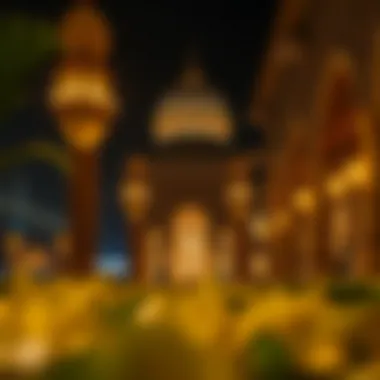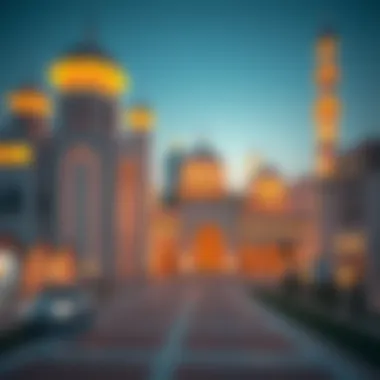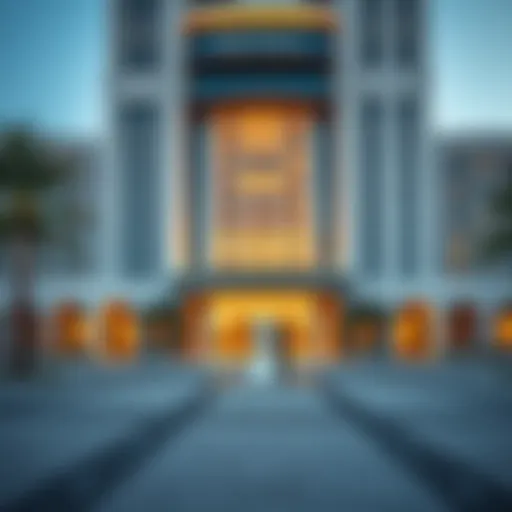Dubai Ramadan Timing 2024: A Comprehensive Guide


Intro
Ramadan is not merely a month of fasting; it holds a profound significance in Dubai's cultural fabric. This sacred period brings together both residents and visitors in a series of communal practices, prayers, and reflections. In 2024, understanding the Ramadan timings in Dubai becomes essential, not just for those observing the fast but also for expats and investors navigating the city's diverse landscape. As the sun sets each day, a transformation occurs. Streets come alive with the aroma of traditional dishes, tents filled with families gathering for Iftar, and mosques resonate with the call to prayer. The city’s rhythm shifts, and daily life takes on a new cadence.
This overview aims to provide a complete guide to Ramadan in Dubai for 2024. From Islamic prayer schedules to meal timings, we will delve into how this holy month influences the lifestyle of citizens and visitors alike. Special focus will be given to how these periods impact the real estate sector. Such insights can benefit investors, buyers, agents and developers, alike, allowing them to align their strategies to the peculiarities of a city that balances tradition with modernity.
Understanding Ramadan
Ramadan is more than just a month on the Islamic calendar; it’s a profound period that carries immense spiritual weight for Muslims worldwide. The primary focus during Ramadan is observed with fasting, prayer, reflection, and community. In the context of Dubai, known for its diverse population and modernity, Ramadan has unique implications that reverberate through the daily lives of residents and visitors alike. For any investor, real estate agent, or expatriate entering this vibrant city during the holy month, understanding the essence of Ramadan is crucial.
Definition and Significance
Ramadan is the ninth month of the Islamic lunar calendar, marked by fasting from dawn until sunset. Fasting, known as 'sawm,' entails abstaining from food, drink, smoking, and marital relations during daylight hours. This sacred practice is not merely about abstention; it is also about fostering spiritual growth and compassion towards those in need. Through fasting, individuals can find a deeper connection with their faith, engage in self-discipline, and reflect on their purpose in life.
The significance of Ramadan resides in its role as a time for self-restraint and empathy. As it is often said, "The fasting month reminds us of the value of gratitude and mindfulness." Moreover, the month culminates in the celebration of Eid al-Fitr, marking a festive conclusion to the period of fasting, where families come together to feast and share gifts. This dual aspect of Ramadan—self-improvement and community bonding—is what makes this month distinctly impactful for the social fabric of Dubai.
Historical Context
Historically, Ramadan traces its roots back to the time of the Prophet Muhammad, who received the first revelations of the Quran during this month. The significance of these revelations shapes the spirituality and practices associated with Ramadan. In Dubai, a city that has rapidly evolved from a small trading port into a global hub, the traditions of Ramadan have adapted yet retained their core values.
Dubai's diverse population includes numerous expatriate communities, which makes the observance of Ramadan unique. For instance, the Gulf state has always prided itself on being a melting pot of cultures, and this is reflected in how different communities observe Ramadan. This convergence of practices contributes to the rich tapestry of traditions that characterize the month, making it a fascinating time to witness the blending of cultures in daily life.
Ramadan Timing in
Understanding the timing of Ramadan in 2024 is crucial for both the local community and those visiting Dubai during this sacred month. The timings dictate not only the daily rhythms of fasting and prayer, but also influence social interactions, economic activities, and lifestyle adjustments seen throughout the city. For investors and expatriates, awareness of these timings may affect their daily operations and engagement with the community. In a city that thrives on its multicultural fabric, respecting Ramadan's framework can pave the way for thoughtful connections and enhanced rapport among diverse populations.
Start and End Dates
Ramadan is determined by the lunar calendar, causing its dates to vary each year. In 2024, it is anticipated that Ramadan will begin on the evening of March 10, with the first day of fasting commencing on March 11. This cycle will culminate with Eid al-Fitr, marking the end of fasting, likely observed on April 9 or April 10, depending on the moon sighting. The beginning and ending of Ramadan are pivotal, prompting preparations for spiritual reflection and various community events. Knowing these dates is essential not just for individual observance but also for planning business activities and events within the expat and local communities alike.
Daily Prayer Timings
During Ramadan, the daily prayer schedule gains heightened importance. Muslims observe five daily prayers, but during this holy month, the focus is primarily on pre-dawn prayers and the evening Taraweeh prayers, which hold special significance. The timings for Fajr, the first prayer, signal the start of the fast. In 2024, Fajr prayer will be around 4:30 AM, whereas the Maghrib prayer, which marks the time to break the fast, will be approximately at 6:40 PM. Taraweeh prayers follow the Maghrib prayer and can extend into the night, engaging the community in congregational worship. Here’s a simplified view of the key prayer timings:
- Fajr (Pre-dawn): ~4:30 AM
- Dhuhr (Noon): ~12:30 PM
- Asr (Afternoon): ~3:45 PM
- Maghrib (Sunset): ~6:40 PM
- Isha (Night): ~8:00 PM
As the timings can fluctuate slightly with astronomical observation, it’s advisable for individuals to consult a reliable local Islamic calendar or websites such as IslamicFinder.
Iftar and Suhoor Times
Iftar, the meal to break the fast, holds a significant social and cultural role. In 2024, Iftar will take place around 6:40 PM, coinciding with the Maghrib prayer. Many families and friends gather to share this meal, often enjoying traditional dishes and refreshing drinks. Suhoor, on the other hand, is the pre-dawn meal that takes place shortly before Fajr. In 2024, individuals will partake in Suhoor around 4:00 AM.
For those new to Dubai, it’s worth noting that many restaurants shift their operating hours to accommodate fasting individuals. During this time, many eateries will offer special Iftar promotions, contributing to a surge in business.
Overall, understanding Iftar and Suhoor provides insight into the lifestyle adjustments for both residents and visitors. It demonstrates the communal spirit of Ramadan, encouraging connections through shared meals, creating a vibrant atmosphere in the city.
"Ramadan is not just a month of fasting; it's a period of reflection, gratitude, and community engagement."


By grasping the timings associated with Ramadan in 2024, both residents and visitors can navigate their daily activities while honoring this significant period with respect and enthusiasm. For anyone involved in the Dubai property market, observing these timings may also align strategic business decisions around community events and gatherings.
Daily Life During Ramadan
During Ramadan, daily life in Dubai morphs significantly, reflecting the essence of this sacred month. The city, bustling with non-stop activity, sees a pivot toward spiritual reflection and communal gatherings. Residents and visitors alike find themselves navigating a tapestry of changes that are both intrinsic to their routine and deeply rooted in the cultural practices of the region. Grasping the nuances of daily life during Ramadan provides key insights into how individuals engage with their surrounding environment, manage their schedules, and partake in community traditions, collectively enhancing the experience of this holy month.
Adjustments for Residents
For many residents in Dubai, Ramadan calls for thoughtful adjustments in their daily routines. Given the fasting schedule from dawn until dusk, many folks find themselves revamping their meal hours, work commitments, and social interactions.
- Work Hours: Many companies shift their office hours to accommodate the fasting schedule. Typically, work begins later in the morning and finishes earlier in the afternoon, allowing employees to prepare for iftar, the evening meal breaking the fast.
- Meal Preparation: Households see a surge in activity during the pre-dawn hours, known as suhoor, where families gather for a hearty meal before embarking on their fast. This early morning routine is crucial—it sets the tone for the day and ensures that energy levels are maintained.
- Quiet Mornings: Unlike the usual hustle and bustle, mornings become quieter. Many residents opt for reflection, prayer, or simply enjoying a leisurely start as they prepare for their daily responsibilities while observing the principle of fasting.
- Community Engagement: There's a heightened sense of community as many residents take part in charitable acts or volunteer efforts. This spirit is infectious, creating an atmosphere of generosity and kindness that envelops the city.
Adapting to these changes supports a balanced lifestyle during the month and fosters connections both within families and across the broader community.
Considerations for Visitors
For visitors to Dubai during Ramadan, there are important considerations to keep in mind to respect local practices while still enjoying the vibrant culture of the city. Here are a few pointers that can help ensure an enriching experience:
- Respecting the Fast: Visitors should be mindful of those who are fasting. Eating, drinking, or engaging in loud entertainment in public places is generally frowned upon during daylight hours. Many malls and public areas will provide designated spaces for eating away from the general public to honor the traditions observed by locals.
- Altered Timings: Restaurants might adjust their operating hours, opening later to serve suhoor and iftar meals. Familiarizing oneself with these timings allows visitors to plan their days better and partake in the local culture.
- Cultural Sensitivity: It’s essential to be aware of local customs and practices. Engaging in polite conversation and expressing interest in the significance of Ramadan can foster understanding and build connections with locals.
- Events and Activities: The evenings during Ramadan brim with community events like iftar gatherings and cultural performances. Many visitors find it rewarding to participate in these initiatives, offering a glimpse into the heart of Dubai's deep-rooted traditions.
Ramadan is more than just a month of fasting; it’s a time for reflection, community, and cultural exchange.
By considering these adjustments and respecting the primary values of the month, visitors can savor a unique experience unique to Ramadan in Dubai.
Cultural Practices and Traditions
Ramadan in Dubai is not just a period of fasting; it's a tapestry woven with rich cultural practices and traditions that reflect the heart of the Emirati spirit. These traditions serve not only as a means to observe the holy month but also as catalysts for community bonding, social interaction, and the continuation of heritage. Immersing oneself in these customs during Ramadan enhances the experience of both residents and visitors, making it a period of profound reflection and celebration.
Common Customs in Dubai
In Dubai, the customs during Ramadan breathe life into the tranquil evenings when the sun sets. Families and friends gather to break their fast with iftar, the meal that takes place at sunset. Traditional dishes like dates, soup, and stuffed grape leaves grace the tables, representing a blend of flavors and cultures that are as diverse as the city itself.
Moreover, it’s common to hear the call to prayer echoing through the air, a sound that resonates deeply with the faithful, signaling the time to pause and reflect.
Another notable custom is the preparation for suhoor, the pre-dawn meal. Families often come together, enjoying a hearty meal before the fasting begins anew. It’s a time of connection and sharing, reinforcing bonds amongst loved ones.
The practice of charity, or zakat, is particularly emphasized during Ramadan. Many residents engage in charitable acts, distributing iftar meals to the less fortunate. This custom echoes the essence of Ramadan—generosity and compassion toward others.
Role of Community Events
Community events play an essential role in the fabric of Dubai’s Ramadan experience. From large public iftars to cultural festivals, these gatherings encourage not only fellowship but also inclusivity among the diverse populace of Dubai. Events such as the Ramadan Night Market and various cultural exhibitions bring together residents of different backgrounds, allowing them to share in the joyous atmosphere.
During the evenings, one can find open-air events where people of various nationalities enjoy traditional music, dance performances, and delicious cuisine. These occasions foster a sense of belonging, creating a microcosm of unity in diversity that Dubai epitomizes.
In addition, mosques across the city often host lectures and discussions, delving into the spiritual significance of Ramadan. These sessions invite attendees to deepen their understanding of the month’s true purpose, sparking engaging conversations that resonate long after the month is over.
The spirit of Ramadan in Dubai transcends religious observance; it cultivates an atmosphere of togetherness, compassion, and community spirit that lingers in the hearts of its people.


Impact on Real Estate
The significance of Ramadan on the real estate sector in Dubai operates on multiple fronts. The holy month influences both demand and pricing trends, creating shifts that agents, buyers, and investors must navigate. This period pushes many expatriates and residents to rethink their living situations as community and family ties become paramount. Understanding these nuances is critical for those involved in the city's property market.
Demand for Properties
During Ramadan, the demand for properties can increase notably. Many families consider relocating to areas that are closer to their mosques or have a larger expatriate community, making accessibility to religious and social gatherings a key element. Additionally, the influx of visitors during this period adds pressure on rental markets, as people flock to Dubai to experience its vibrant, multicultural observance of Ramadan.
- Key Factors Influencing Demand:
- Observational Trends:
- Proximity to mosques and community centers
- Availability of family-friendly amenities
- Temporary housing for tourists and returning expatriates
- Interest spikes in larger homes to accommodate extended family visits
- Short-term rentals see increased booking rates due to tourists seeking the Ramadan experience
In some instances, locals may also search for properties in areas previously unfamiliar to them, seeking more vibrant cultural experiences during the month.
Rental Trends During Ramadan
Rental trends during Ramadan offer another layer of complexity to the real estate landscape. Some landlords might implement flexible terms to attract tenants, understanding the cultural importance and the shifting priorities of families during this time. The best strategy typically includes offering short-term leases, as many could seek to cash in on the festive vibes of Dubai.
Another trend involves reduced rates for certain properties, as landlords often lower prices to guarantee occupancy amid heightened competition. This fluctuating pricing creates opportunities for both seasoned investors and those considering entry into the market.
Consideration of additional features, such as the inclusion of iftar meals or cultural experiences within rental agreements, has also become common. This adds an extra layer of attraction for potential renters, as it aligns with the spirit of community and generosity that Ramadan embodies.
"This month sees the fusion of tradition with modern housing solutions—it's not just about the property, but the lifestyle it offers during this unique time."
In summary, the real estate dynamics during Ramadan are a blend of cultural observance and market strategy. For those looking to make informed decisions, understanding these trends is essential, enabling a guided approach to investment and rental decisions.
Diversity of Observance
The diversity of observance during Ramadan in Dubai captures a broad spectrum of traditions and practices, reflecting the city’s rich tapestry of cultures. People from numerous backgrounds inhabit this vibrant metropolis, leading to unique expressions of faith and community spirit. This diversity illustrates not only the importance of Ramadan from a religious standpoint but also underscores how it weaves various cultures together, fostering unity and understanding among residents and visitors alike.
Different Practices Among Expat Communities
In Dubai, expatriates come from various corners of the world, each bringing their individual practices to the forefront during Ramadan. For instance, the practices of the Indian Muslim community may lean towards communal iftars with spicy biryani and sweets, whereas the Lebanese might incorporate dishes like mezze and grilled meats at sunset. This cultural medley enriches the dining experience during the holy month.
Furthermore, some communities establish their own tented venues for iftar—large communal gatherings where people break their fast together. These tents often cater to the cultural nuances of different nationalities, creating a sense of belonging for potentially homesick residents. Such spaces promote connections beyond mere feasting; they serve as social hubs for community bonding.
- Examples of differing practices include:
- Indian Muslims prioritizing biryani and samosas.
- Lebanese communities opting for mezze platters.
- Filipinos often having a mix of local desserts and traditional foods.
This cultural exchange during Ramadan serves as an opportunity for expatriates to bond over shared meals, forming friendships and strengthening community ties.
Comparative Observance Across Cultures
The juxtaposition of observance styles among various cultures in Dubai offers a fascinating glimpse into how Ramadan is celebrated differently across the globe. In Western cultures, for instance, there might be a less intense focus on fasting during the daylight hours, but it does not take away from the significance of prayer and reflection. On the other hand, more traditional Muslim countries maintain stringent fasting routines, often accompanied by communal prayers, which might not be as prevalent in more diverse settings like Dubai.


For some Bahrainis, the evening prayers called Taraweeh can turn into family events filled with storytelling and recitals. Meanwhile, Turkish expats might engage in setting up special Ramadan markets, offering everything from sweets to traditional crafts. Likewise, African communities may use the month for not just fasting but also for charitable acts, emphasizing zakat, or almsgiving, as integral to the spiritual journey of Ramadan.
In essence, observing Ramadan in Dubai becomes not just about fasting and prayer; it transforms into a broader cultural festival. The willingness of different communities to embrace and adapt various practices sheds light on the inclusiveness of Dubai’s social landscape.
As a result, participants—both locals and expats—find a common thread that ties them together: the spirit of Ramadan which celebrates humility, compassion, and community.
"Ramadan stands not solely for fasting but embodies a kaleidoscope of cultural practices, underscoring connections between people, regardless of their origins."
Understanding these variations not only aids in providing a richer picture of Ramadan in Dubai but also enhances the experience for those involved. People learn to appreciate each other’s cultural nuances, ultimately forging stronger ties within the community. Thus, the diversity of observance serves as both a reminder of the myriad ways faith can be expressed and the beauty of communal life in one of the world’s most eclectic cities.
Challenges Encountered
Understanding the challenges encountered during Ramadan is crucial, especially in a diverse and rapidly developing city like Dubai. Not only do these challenges impact the individuals observing the fast, but they also explore the broader implications on lifestyle, community interaction, and even economic practices. By delving into this topic, we can identify significant hurdles and strategies that are peculiar to the local environment, offering valuable insights for residents and visitors alike.
Health Considerations
Fasting during Ramadan presents unique health considerations that cannot be overlooked. Individuals must adapt their diets and hydration routines significantly. For example, the long daylight hours in Dubai can make meals particularly challenging. The midday heat can exacerbate issues of dehydration for those fasting—leading to fatigue, dizziness, and in some cases, more serious health risks. It is important for individuals to plan their meals carefully during Suhoor and Iftar to ensure they receive balanced nutrition and enough hydration.
A few thoughtful practices may help mitigate health challenges:
- Hydrate Strategically: Drink water during non-fasting hours, prioritizing hydration rather than consumption of sugary or caffeinated beverages.
- Balanced Meals: Ensure meals are rich in fibers, proteins, and essential nutrients to keep energy levels stable.
Moreover, individuals with underlying health issues should consult healthcare professionals prior to Ramadan to tailor a plan that accommodates their fasting requirements. This facet of Ramadan can seem daunting but offers an opportunity for individuals to engage with their health actively.
“The key to lasting health during Ramadan lies not only in what you eat but also in how you manage your time and energy throughout the day.”
Time Management During Fasting
Effective time management during the fasting period is often overlooked but is essential for a seamless daily routine. With the added demands of work, prayer, and fasting, individuals may find themselves spread thin. The timings for Suhoor and Iftar can drastically shift one’s daily schedule. Aligning professional commitments with prayer times and fasting responsibilities requires careful planning.
Here are some strategies that might help:
- Set Clear Timelines: Prioritize tasks early in the day when energy levels are higher, and schedule breaks as needed.
- Utilize Technology: Use smartphone applications that provide prayer timings to keep connected to spiritual needs while managing schedules effectively.
- Communicate with Colleagues: If working in an office environment, inform co-workers about your fasting needs. A little understanding can go a long way in smoothing out any bumps during the workweek.
Ultimately, mastering time management skills during Ramadan not only enhances personal experiences but can also foster a collaborative and understanding environment in workplaces and social settings.
End: Embracing the Spirit of Ramadan
As we draw a close to our exploration of Ramadan timings in Dubai for 2024, it becomes clear that the significance of this sacred month stretches beyond mere adjustments in daily schedules. The essence of Ramadan lies in its ability to foster a sense of community, spirituality, and reflection. Whether one is a long-time resident or a newcomer to Dubai, immersing oneself in this period enriches life’s tapestry in remarkable ways.
Reflection on Experiences
When it comes to Ramadan, individual experiences can vary widely. People often find themselves reflecting on their own beliefs and lifestyles. For a practicing Muslim, the month is a time for spiritual rejuvenation. Fasting, for instance, encourages not only self-discipline but also empathy for those who are less fortunate. Many engage in charitable activities more than usual—donating time or resources becomes a common thread among the community. For expatriates, who may not share the same religious traditions, this month offers an opportunity to learn and understand the cultural nuances that shape their surroundings.
- Personal Growth: Participants often report feeling a level of self-awareness and growth that extends beyond the month.
- Community Engagement: Attending iftar gatherings, whether large or small, builds connections, bridging cultural divides.
- Mindfulness: The fasting period encourages mindfulness, heightening awareness of daily habits and consumption patterns.
These reflections echo an underlying theme: Ramadan is as much about looking inward as it is about reaching outward.
Looking Ahead
What lies ahead as Ramadan concludes? The conclusion of this holy month doesn't signify an end, but rather a renewal of commitment to better practices. Many people aim to carry the virtues and lessons learned during Ramadan into their everyday lives. As we step into the post-Ramadan period, traditional values of compassion, gratitude, and self-control remain paramount.
- Sustaining Relationships: The bonds forged in this month shouldn't fade after the last dates are broken. Regular gatherings can continue, lifting the communal spirit of worship and friendship.
- Adopting New Habits: Some may choose to maintain the dietary adjustments made during Ramadan, or perhaps the focus on daily prayers becomes a fixture in their lives.
- Civic Responsibility: Increased participation in local events and initiatives is a common trend as people feel a heightened sense of civic duty post-Ramadan.
In summary, embracing the spirit of Ramadan fosters not only personal development but also encourages a tighter community fabric, ultimately leading to a healthier, more vibrant Dubai for all its residents, whether old or new. As the sun sets on Ramadan 2024, may its impact on the city linger, paving the way toward inclusive growth and continuous reflection.







